June 27, 2022 IN: Education, Staff Blog
Why SEARAC continues to advocate for data equity
by Natalie Truong
SEARAC continues to champion data equity for Southeast Asian Americans (SEAAs) in policy and programming. While varying issues affect SEAA youth, we cannot tackle many of them without adequate data that specifically addresses our communities. Unfortunately, our schools and many of our government agencies still do not collect and report data that is disaggregated to the SEAA ethnic communities, leaving advocates and the public largely unaware of how SEAAs fare in the United States.
Aggregating SEAA ethnoracial identities into a lump “Asian American” category does a huge disservice to the unique experiences and challenges that each of these communities faces. SEAA refugees and their descendants have different historical backgrounds, cultures, and challenges that are made invisible by the label of Asian American. SEAA communities face trauma from US involvement in the Vietnam War, political persecution, and genocide.
When we disaggregate Asian American data, we find that Cambodian, Hmong, Lao, and Vietnamese communities have some of the highest rates of poverty and lowest educational attainment rates among all racial groups. Nationwide, close to 1.1 million SEAAs are low-income, including over 460,000 who live in poverty. Additionally, 42% of Cambodian, 44% of Hmong, 48% of Lao, and 37% of Vietnamese American high school graduates have not continued on to earn their bachelor’s degree, compared to 29% of all Asians. Our communities also have high rates of anxiety, depression, post-traumatic stress disorder, and diabetes. This data, along with community narratives and migration patterns, show us that poverty travels across generations in our communities. Refugee families continue to face economic, educational, and health challenges with inadequate support and attention.

A screenshot from Quyen’s presentation at this year’s Grandmakers in Education virtual event
As Quyen Dinh, SEARAC’s Executive Director, shares on a 2022 data disaggregation panel with Grantmakers in Education: “Behind every bar graph and every statistic is a lost brother and a lost sister who have been underserved by our education system. For the past two decades, SEARAC has worked to advocate for national data disaggregation because we believe in dismantling institutionalized racism and institutionalized systemic barriers requires policy change and requires that this change be led by those who are most impacted. We believe this fight is about our right to be seen, to be heard, and to be valued.”
SEAA refugees and their descendants have different historical backgrounds, cultures, and challenges that are made invisible by the label of Asian American.
Recently, the White House announced its intention to revise the Office of Budget and Management’s Statistical Policy Directive No. 15: Standards for Maintaining, Collecting, and Presenting Federal Data on Race and Ethnicity (SPD 15) by Summer 2024. Given the urgency of the need to further disaggregate data for Asian Americans and the recommendations made by our communities over the years, the SPD 15 revision needs to come sooner. SEARAC also urges the White House to include the collection and reporting of at least Cambodian, Lao, Hmong, and Vietnamese categories, and further disaggregate to include Iu Mien and Montagnards whenever feasible.
The SEAA story differs from other Asian American narratives. By grouping SEAAs under the Asian American umbrella without continued, explicit acknowledgement of our stories and of our differences through both data and narrative, the federal government erases the unique needs and challenges faced by Southeast Asian refugees.
Natalie is SEARAC’s Education Policy Manager. You can email her here.





